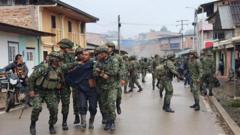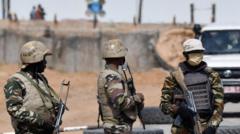#### Mali's military faces rising assaults from jihadist groups as local and international concerns escalate over security in the Sahel region.
### Jihadist Assaults on Mali Military Bases Escalate Tensions

### Jihadist Assaults on Mali Military Bases Escalate Tensions
#### Recent attacks highlight ongoing insecurity and insurgent threats in Mali.
In a dramatic escalation, jihadist fighters have launched a series of coordinated attacks on military posts across multiple towns in Mali, marking the third major assault on the army in just a month. The Mali army has reported that it repelled these attacks on Tuesday morning, claiming to have "neutralised" more than 80 militants, though it did not confirm any additional casualties.
The attacks were attributed to Jama'at Nusrat al-Islam wal Muslimin (JNIM), an al-Qaeda-affiliated group that asserts it has taken control of three army barracks during the assaults. The conflict in the region has simmered for over a decade, fueled by a deadly Islamist insurgency alongside separatist movements.
Army spokesperson Col Souleymane Dembele stated on national television, "The enemy suffered significant losses in every location where they engaged with the security and defence forces." He also noted that the military managed to recover weapons, vehicles, and motorcycles from the militants involved in the attacks.
The assaults occurred in seven towns and cities, including Binoli, Kayes, and Sandere, all situated near the border with Senegal, as well as further north by the Mauritanian frontier. Witnesses in Kayes reported waking to the sounds of gunfire and plumes of smoke rising towards local government buildings.
JNIM publicly referred to its operation as a "co-ordinated and high quality" assault in a statement shared through social media platforms, although it did not provide details on casualties incurred during these engagements. The group has previously discussed significant attacks, including an assault on an army camp and an airport in Timbuktu in early June, and a raid that resulted in the deaths of at least 30 soldiers a day prior.
These activities illustrate the growing insecurity not only in Mali but also throughout the Sahel region. Alarmingly, a recent warning from United States Africa Command highlighted the increasing capabilities of various Islamist militant groups in their efforts to penetrate into West Africa's coastal areas, which could enhance their capacity for smuggling and arms trafficking.
Concerns about the security situation have prompted ongoing discussions about the implications for local residents and the broader implications for the international community.
The attacks were attributed to Jama'at Nusrat al-Islam wal Muslimin (JNIM), an al-Qaeda-affiliated group that asserts it has taken control of three army barracks during the assaults. The conflict in the region has simmered for over a decade, fueled by a deadly Islamist insurgency alongside separatist movements.
Army spokesperson Col Souleymane Dembele stated on national television, "The enemy suffered significant losses in every location where they engaged with the security and defence forces." He also noted that the military managed to recover weapons, vehicles, and motorcycles from the militants involved in the attacks.
The assaults occurred in seven towns and cities, including Binoli, Kayes, and Sandere, all situated near the border with Senegal, as well as further north by the Mauritanian frontier. Witnesses in Kayes reported waking to the sounds of gunfire and plumes of smoke rising towards local government buildings.
JNIM publicly referred to its operation as a "co-ordinated and high quality" assault in a statement shared through social media platforms, although it did not provide details on casualties incurred during these engagements. The group has previously discussed significant attacks, including an assault on an army camp and an airport in Timbuktu in early June, and a raid that resulted in the deaths of at least 30 soldiers a day prior.
These activities illustrate the growing insecurity not only in Mali but also throughout the Sahel region. Alarmingly, a recent warning from United States Africa Command highlighted the increasing capabilities of various Islamist militant groups in their efforts to penetrate into West Africa's coastal areas, which could enhance their capacity for smuggling and arms trafficking.
Concerns about the security situation have prompted ongoing discussions about the implications for local residents and the broader implications for the international community.




















